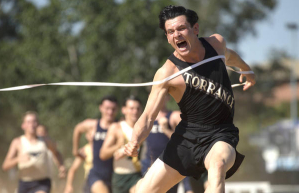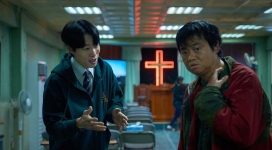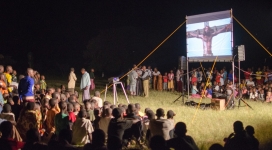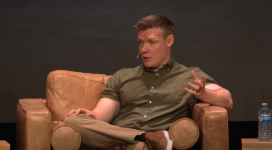
The upcoming film Unbroken, directed by Angelina Jolie, tells the true story of an Olympian and World War II veteran named Louis Zamperini who later became a Christian and forgave the Japanese captors who tortured him in various prisoner-of-war camps. However, some people are unhappy at the way Christianity is portrayed in the film, arguing his conversion should have played a bigger role.
According to Sarah Pulliam Bailey of Religion News Service, Unbroken did not mention Jesus or Billy Graham, but focused on faith in a generic sense. Bailey argued that Jolie's own lack of faith made others question her role as the film's director.
"The film does include some generic portrayals of faith and God," Bailey wrote. "Early in the film, Zamperini is scolded for not paying attention in church while the priest tells congregants to love their enemies. He watches as his mother prays, and he asks his fellow crash survivor about his faith."
Bailey added that aside from Zamperini's prayer while being stranded 47 days at sea, the theme of faith "is mostly absent from the rest of the film." However, Zamperini's son, Luke Zamperini, argued in a Townhall column that his father was pleased with the way Jolie depicted the subject of his Christian faith.
"Dad, you see, survived the horrors of war physically unbroken, but returned to the states emotionally shattered," Luke wrote about his father. "Suffering from PTSD, he tried to kill the pain with alcohol and was consumed by visions of murdering his chief Japanese tormentor, a sadistic man nicknamed 'The Bird' by inmates. It was only when, at the urging of my mother, he attended a Billy Graham crusade in 1949 and surrendered his life to Jesus Christ that my father truly became unbroken."
His son admitted that the Unbroken film does not dedicate a lot of time on Zamperini's Christian conversion, but it is mentioned through a series of text cards before the closing credits.
"After years of severe post-traumatic stress, Louie made good on his promise to serve God, a decision he credited with saving his life," one slide at the end of the film said. "Motivated by his faith, Louie came to see that the way forward was not revenge, but forgiveness."
Luke defended that action of mentioning his father's faith through the text cards at the film's end, saying that decision was intentional.
"That is exactly the way my Dad and our entire family wanted it," Luke said. "As he said in his autobiography, DEVIL AT MY HEELS, 'The great commandment is that we preach the gospel to every creature, but neither God nor the Bible says anything about forcing it down people's throats.'"
Luke added that the film told his father's story exactly as he wanted to relay it.
"UNBROKEN tells my Dad's story the way he told it: chronicling all he lived through so that what he did after becoming a Christian -forgiving his captors -would have the most resonance with audiences of all faiths, and no faith at all," Luke wrote.
People across the United States have asked Luke repeatedly on how his father was able to forgive the guards "who beat him mercilessly." Zamperini's son noted that most of those people asking that question did not read Laura Hillenbrand's book or practice the Christian faith in their own lives.
"Dad got those same questions, thousands of times over five decades plus, and he used them as an opportunity to explain how Jesus had removed the hate from his heart," Luke wrote. "Who knows how many people -hardened to the things of God -pondered his answer and now find themselves sharing heaven with my father because of it?"
Luke commented that his father's greatest hope for the Unbroken film was that "it would be seen by non-Christians drawn to a rousing epic about the indomitable human spirit who, when the credits have finished rolling, might just discover there's a whole lot more to his story than that."
California pastor Greg Laurie had a strong opinion on what was the best part of Zamperini's story.
"To me, the most amazing part of his story is not just surviving the incomprehensible beatings in the Japanese internment camp, or being adrift at sea for over 47 days," Laurie said. "It was the fact that Louie was able, because of his conversion and newfound Christian faith, to go back to Japan to the very guards who mistreated him and forgive them, as well as tell them about Jesus Christ."







